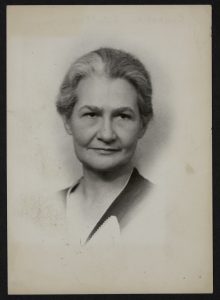
Cornelia Coulter experienced a number of “firsts” as an educator and leader in Latin studies. She was awarded one of the first John Hay Whitney prizes for excellent liberal arts college professors and was the first woman to receive it.1 She created and served as first chair of the Classical Languages and Literature Department at Mount Holyoke.2 She was also the first person to start a scholarship enabling professors to study at the American Academy in Rome.3 These “firsts” were not by chance. Coulter’s strong leadership skills and dedication to teaching paved the way for these amazing opportunities.
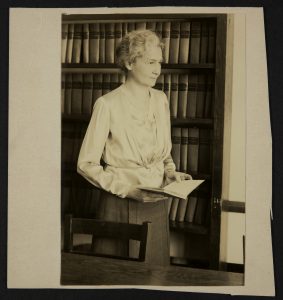
Constructing the Classical Languages and Literature Department
Although Coulter taught at six different colleges within her lifetime, she devoted most of her efforts to the Mount Holyoke community – specifically the Classical Languages and Literature Department. Previous to 1935, the Latin Department, Greek Department, and [classes in] Medieval and Ancient Studies acted independently. Coulter was instrumental in combining the departments to form the Classical Languages and Literature Department, serving as the chair from 1935 to 1948.4 Coulter wrote in a department report, “The cooperation between the two departments was close before and so the change has been noticeable chiefly in certain details of organization and in the distribution of work within the department.”5 This reorganization meant heavy work for the department faculty and the need to reduce course offerings. However, Coulter’s efforts paid off: the following years’ reports noted an increase in Classics majors and a greater campus presence as a department.6
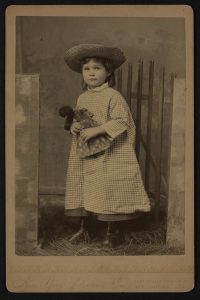
Mount Holyoke was not the beginning of Coulter’s educational career. Coulter was born and raised in Ferguson, Missouri on December 27, 1885 to Horace Parshall Coulter, a Presbyterian minister, and Laura Chamberlain Coulter. She began her education at Washington University in St. Louis, Missouri, earning a Bachelor of Arts in 1907. Pursuing her love for Latin, Coulter received a doctorate from Bryn Mawr in Latin in 1911. Her dissertation, entitled “Retratio in the Ambrosian and Palatine Recensions of Plautus: A Study of the Persia, Poenulus, Pseudolus, Stichlus, and Trinummus”, studied ancient Latin plays and theater works of Titus Plautus written around 250 to 185 BCE.
Coulter’s first teaching position kept her at her alma mater, Bryn Mawr, instructing and reading Latin. She commented of her time: “My work here keeps me busy – busier than I had any idea it would when I contracted to do it…But on the whole the teaching is going pretty well, and I am enjoying it.”7 Coulter’s personality shines through when she later wrote: “The gem of my collection comes from a verse translation of Horace. I demanded these versions of the class and most of them responded nobly. But there were some over which I giggled so loudly as I read them that my room-mate inquired the cause of my merriment, and then we went into pearls of laughter together.”[Ibid.] Upon leaving Bryn Mawr, Coulter took up positions at Saint Agnes School in New York (1912-1916) and Vassar College in New York (1916-1925) teaching Latin and Greek as an associate professor. In 1926, Coulter arrived at Mount Holyoke, where she stayed until retirement in 1952.
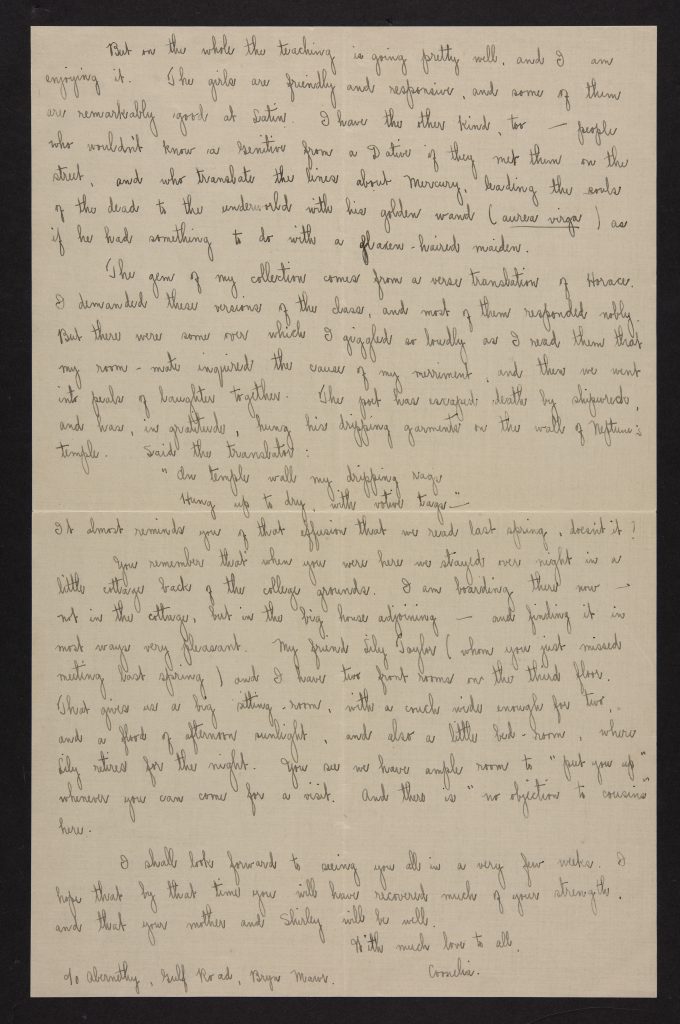
Coulter’s position as professor and chair of the Classics Department did not limit her to the classroom. She acted as president of Mount Holyoke’s Phi Beta Kappa Chapter.8 She helped backstage with many department and school plays,9 and arranged visit days for Holyoke high school students.10 She organized lecture series and other events for the department, going so far as to ask the Board of Trustees to pay for publishing the lecture series for the edification of anyone who could not attend.11 Coulter clearly went above and beyond the call of duty in her role, making the Classics department incredibly dynamic and lively.
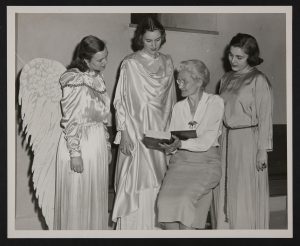
Involvement Outside Mount Holyoke’s Gates
Although Coulter devoted much of her time to Mount Holyoke, her involvement in the Classics field extended beyond the college gates. She served as president of the Classical Association of New England, the American Philological Association, and the Western Massachusetts Society of the Archaeological Institute of America. She also served on numerous special committees within these associations. In photographs of these societies’ executive boards, she is often the only female.12 Clearly she did not let gender disadvantage her in pursuing the positions she desired. Coulter especially made significant contributions to the Classical Association of New England by establishing a scholarship for study at the Summer Session of the School of Classical Studies at the American Academy in Rome. Professor Claude Barlow called her “the greatest single benefactress” of the organization because she was “the largest single contributor to the Rome Scholarship Fund, and for several years she provided anonymously the full amount of the annual awards.”13 On an average professor’s salary, this large donation to the scholarship demonstrated her strong commitment to furthering education in Rome.14
[slideshow_deploy id=’577′]
Coulter’s interest in affairs overseas began in 1908, when she studied abroad for a full academic year in Munich, Germany. Germany was considered the premier place to study philology and languages at the turn of the 20th century,15 and Coulter desired to delve into these subjects. She greatly enjoyed her time there, writing: “Munich is a beautiful city, with free exhibitions of fine old masters like Dürer and Holbein, and modern painters like Böcklin…There is so much to see and so much to do.”16
While studying abroad, she had the chance to visit Rome and discovered the classical wonders the ancient city had to offer. She wrote in a letter to her cousin:
Of course the thing that interests me most here is the ancient city…There are a large number of obelisks that the Roman emperors brought from Egypt, in most commanding positions all over the city – the one that I like best is down a long vista where one sees it against a background of the sky and the sunset glow touches it charmingly.17
[slideshow_deploy id=’526′]
A deep adoration for Rome seemed to stay with her long after she returned back to America. In the fall of 1932 and the summers of 1934 and 1936, Coulter had the opportunity to go to the American Schools of Classical Studies in Rome and Athens, both primer locations to study Latin. She enjoyed her time in Rome especially and wrote: “Rome is full of interesting things, and I haven’t seen half of them yet. The other students in the School are all younger than I, but very good company.”18 Although Coulter only studied in Rome a few times (much less than others in her field), she always returned to America excited to use her experiences for her main passion: teaching. Lucy T. Shoe, a fellow Classicist and colleague of Coulter, spoke of this, stating: “The time she spent at the Schools in Athens and Rome she always considered her happiest days and she gave unstintingly of her time and effort to provide like opportunity to as many of her own and other students as possible.”19
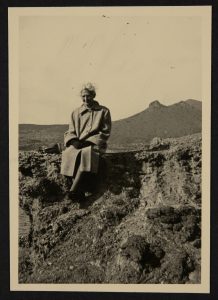
Coulter’s object donations seem to illustrate a dedication to teaching. Many other scholars in her field focused their energies on traveling and collecting antiquities. She chose to donate the antiquities she acquired, namely two rare papyri fragments from Egypt during the Roman Period. One fragment, from the 5th-6th century CE, contains Greek text.20 The other fragment, from 276-282 CE, is an application or petition written in Greek to a ducenarius from a native of Memphis during the reign of Probes.21 These two precious fragments advanced student’s knowledge of ancient cultures in Coulter’s days and are still used for teaching today.
[slideshow_deploy id=’531′]
Later Years and Legacy
Coulter’s passion for teaching continued until the day she died. She formally retired from Mount Holyoke in 1952. However, she was honored with a John Hay Whitney prize for excellent liberal arts college professors, teaching at Hiram College in Ohio from 1952-1953. She even returned to Mount Holyoke for a semester to fill the spot of an ill professor. She wrote in a letter, “I was called back to Mount Holyoke suddenly in September, 1957, to substitute for a member of the Classics Department who was ill…It was sheer joy-teaching familiar subjects to an unusually fine lot of students, seeing old friends, and living through a New England autumn, including a Mount Holyoke Mountain Day, which I had never expected to experience again.”22 The University of North Carolina at Chapel Hill also invited Coulter to teach, again delaying her retirement. She recounted: “I received a letter from the Chairman of the Department of Classics at the University of North Carolina, inviting me to come there as Visiting Professor…It was the kind of invitation that one does not turn down.”23 Although “it was the first time she had seen so many boys in one class,” she stated “I like teaching in co-education institutions where I find the classes especially responsive and stimulating.”24
Coulter’s activity in various associations and her continual teaching opportunities were interrupted by deteriorating health. In a letter to her family, she mentioned: “My teaching [at UNC] was of short duration for about the middle of October some circulatory difficulties developed which finally resulted the last week in December in the amputation of my left leg just above the knee.”25 She died soon after at the age of 75 in Newport News, Virginia.
Coulter left a lasting legacy at Mount Holyoke College and in the field of Latin and Classics. The Classics Department has remained unified to this day, illustrating how strong of a foundation she built. The Cornelia Coulter Scholarship sends students to study at the American Academy in Rome to this day. Her publications dealing with Greek and Latin poetry, medieval writing, Latin language, and Roman writings are still cited in the study of Classics.26 Her inspiring nature as a teacher and scholar are remembered as well. Reverend Ronald Tamblyn, Associate Professor of Religion at MHC, described her as a “great scholar and great woman who was ever generous of her time and attention.”27 Lucy Shoe perfectly illustrated the whole of her personality: “Hers was a life dominated above all by giving to others…Her gentle wit, her sage counsel, her indomitable courage and her brilliant mind as well as her rare friendship we shall long treasure.”28
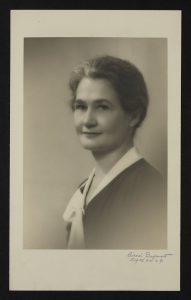
Timeline:
1885
Born December 27 in Ferguson, Missouri. Father (Horace Parshall Coulter) was a Presbyterian minister. Mother named Laura Chamberlain Coulter. Pair had second child in 1892, Joseph.
1907
Received Bachelor of Arts degree in 1907 from Washington University in Saint Louis, Missouri.
1908-1909
Studied abroad for a year at University of Munich
1907-1911
Earned her doctorate from Bryn Mawr College in 1911
1911-1912
Teacher and reader of Latin at Bryn Mawr College
1912-1916
Teacher of Latin and Greek at Saint Agnes School in New York
1916-1925
Instructor and associate professor of Latin and Greek at Vassar College
1926
Arrived at Mount Holyoke College, Became Professor of Latin (in Classical Languages and Literature Department), became chairman of the department from 1935-1948
1932
Studied at American School of Classical Studies in Rome
1934
Studied in Italy during summer
1936
Studied in Italy during summer
1947
Announced $200 scholarship for study at American Academy in Rome, awarded by New England Classical Association. She as president announced it and said any teachers that are members of association are eligible. Also elected to be president of American Philological Association and also served on different committees.
1947-48
President of New England Classical Association
1950
Elected president of the Western Massachusetts Society of the Archaeological Institute
1952
Retired from MHC
1952-1953
Taught at Hiram College
1957
Returned to Mount Holyoke and taught for one semester
1959
Taught at the University of North Carolina
1960
On April 27, died at the age of seventy-five in Newport News, Virginia.
Works cited:
Academic Departments and Programs, Classics department, RG 18.10 (LD 7092.6), Archives and Special Collections, Mount Holyoke College, South Hadley, Massachusetts.
Board of Trustees Files, Records, RG 3.1 (LD 7082 A1), Archives and Special Collections, Mount Holyoke College, South Hadley, Massachusetts.
Christiana Dobrzynski (Bryn Mawr College Archivist), e-mail message to Katia Kiefaber, November 17, 2016.
Faculty and Staff Biographical Files, Coulter Papers, RG 19 (LD 7092.8), Archives and Special Collections, Mount Holyoke College, South Hadley, Massachusetts.
“Papyrus fragment”, Collections database: Five Colleges and Historic Deerfield Museum Consortium, accessed December 7, 2016.
“Papyrus fragment; Petition from a native of Memphis”, Collections database: Five Colleges and Historic Deerfield Museum Consortium, accessed December 7, 2016.
Shoe, Lucy T., “In Memorandum”, American School of Classical Studies at Athens Seventy-Ninth Annual Report (Baltimore, MD: J.H. Furst Company, 1959-1960), 15-16.
Wooley, Allen, “A History of the First Hundred Years of The Classical Association of New England”, CANE: A Centennial History: a 100 Year Retrospective (2006), 6-7.
All images courtesy of Archives and Special Collections at Mount Holyoke College.
written by Katia Kiefaber, Class of 2017
- ASCMHC, Classics Department, General Materials, Scrapbook reflecting department activities, ca. 1910-1953. ↵
- ASCMHC, Classics Department, Department Records from 1935/36, 1937/38-1944/45, “Report for the Year 1935-1936”. ↵
- Ibid. ↵
- Ibid. ↵
- Ibid. ↵
- ASCMHC, Classics Department, Department Records from 1935/36, 1937/38-1944/45. ↵
- ASCMHC, Coulter Papers, Letter to Florence Chamberlain, December 3, 1911. ↵
- ASCMHC, Coulter Papers, Biographical Information (1940-1960), “Phi Beta Kappa Chapt. To Hold Banquet”, April 30, 1943. ↵
- ASCMHC, Coulter Papers, Photographs. ↵
- ASCMHC, Coulter Papers, “Holyoke High School Latin Students Visit Mount Holyoke College”, Holyoke Transcript, 1943. ↵
- ASCMHC, Classics Department, General Materials, Scrapbook reflecting department activities, ca. 1912-1942. ↵
- Ibid. ↵
- Wooley, Allen, “A History of the First Hundred Years of The Classical Association of New England”, CANE: A Centennial History: a 100 Year Retrospective (2006), 6-7. ↵
- ASCMHC, Board of Trustees records, Minutes, Trustees Minutes, 1925-1934, Box 5, Book C. ↵
- Christiana Dobrzynski (Bryn Mawr College Archivist), e-mail message to author, November 17, 2016. ↵
- ASCMHC, Coulter Papers, Letter to Florence Chamberlain, “Easter Sunday” (April 11), 1909. ↵
- Ibid. ↵
- ASCMHC, Coulter Papers, Letter to Daisy Thompkins, December 21, 1932. ↵
- Lucy T. Shoe, “In Memorandum”, American School of Classical Studies at Athens Seventy-Ninth Annual Report (1959-1960), 15-16. ↵
- “Papyrus fragment”, Collections database: Five Colleges and Historic Deerfield Museum Consortium, accessed December 7, 2016. ↵
- “Papyrus fragment; Petition from a native of Memphis”, Collections database: Five Colleges and Historic Deerfield Museum Consortium, accessed December 7, 2016. ↵
- ASCMHC, Coulter Papers, Letter to relatives, September 6, 1959. ↵
- Ibid. ↵
- ASCMHC, Coulter Papers, “Visiting Classics Professor Makes Several Firsts at UNC”, October 16, 1959 ↵
- ASCMHC, Coulter Papers, Letter to friends and relatives, January 3, 1960. ↵
- ASCMHC, Coulter Papers, Writings. ↵
- ASCMHC, Coulter Papers, “Mount Holyoke Service Honors Prof. Coulter”, Springfield Union, May 18, 1960. ↵
- Wooley, Allen, “A History of the First Hundred Years of The Classical Association of New England”, CANE: A Centennial History: a 100 Year Retrospective (2006), 6-7. ↵